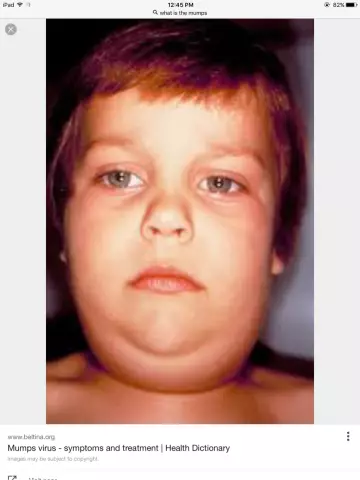- Author Rachel Wainwright [email protected].
- Public 2023-12-15 07:39.
- Last modified 2025-11-02 20:14.
Alcohol intoxication
The content of the article:
- Causes
- Forms and degrees
-
Signs
- Mild alcohol intoxication
- Moderate alcohol intoxication
- Heavy alcohol intoxication
- Altered forms of simple alcoholic intoxication
- Pathological alcoholic intoxication
- Diagnostics
- Treatment
- Prevention
- Consequences and complications
Alcohol intoxication is a transient condition that develops after drinking alcohol. It is provoked by the psychoactive effect of ethanol and is a detailed symptom complex of altered physiological, mental and neurological reactions.

Alcohol intoxication causes changes in human behavioral functions
The intoxicating effect of alcohol is realized due to the excitation of the underlying structures of the central nervous system in conditions of oppression of the higher centers of the cerebral cortex. Stimulation of the peripheral part of the nervous system is also of some importance.
After taking alcohol, its maximum concentration in the blood is determined by the end of the 2nd hour, the degree of intoxication depends not only on the amount of the drink taken, but also on the rate of its consumption. The same volume of alcohol, drunk for a different length of time, has a different effect on the body: in a middle-aged adult man without concomitant pathology of the excretory organs, 200 ml of anhydrous alcohol, drunk in 4-5 hours, will cause persistent intoxication, in 1- 2 hours - acute poisoning.
Alcohol accumulates selectively in the tissues of the brain, where its concentration is 75% higher than in the bloodstream. Normally, within an hour, a healthy liver will inactivate approximately 10 ml of alcohol in terms of anhydrous alcohol.
Alcohol-induced mortality, according to the averaged data of the World Health Organization, is 6.3% in men and 1.1% in women. The highest mortality rate is observed in the countries of Eastern Europe: for example, from 1990 to 2001, more than half of male Russians aged 15-54 years died from causes directly related to alcohol abuse (including pneumonia, tuberculosis, toxic liver damage, kidney injury, injuries).
Synonym: alcohol intoxication.
When physical and mental dependence on ethanol occurs, chronic alcohol intoxication develops - alcoholism.
Causes
The cause of alcohol intoxication is alcohol consumption.
The severity of intoxication directly depends on many factors: gender, age, weight of a person, connection with food intake, genetically determined characteristics (for example, the activity of an enzyme that breaks down alcohol, the body's tolerance), the amount of alcohol consumed per unit of time, its type, quality and strength …
Forms and degrees
Alcohol intoxication is classified according to its severity and form.
According to the degree (according to the alcohol content in the systemic circulation, indicated in ppm), intoxication is divided into the following types:
- Less than 0.3 ‰ - no effect of alcohol on the body.
- From 0.3 to 0.5 ‰ - a slight influence of alcohol.
- From 0.5 to 1.5 ‰ - slight intoxication.
- From 1.5 to 2.5 ‰ - moderate intoxication.
- From 2.5 to 3.0 ‰ - strong intoxication.
- From 3.0 to 5.0 ‰ - alcohol poisoning, death is possible.
- More than 5.0 ‰ (according to some sources - 6.0 ‰) - poisoning that is not compatible with life.
Alcohol intoxication is of the following forms:
- Simple drunkenness.
- Altered simple intoxication (dysphoric, hebephrenic, paranoid and hysterical variants).
In the presence of predisposing factors, an acute transient psychosis may develop, proceeding in the form of a twilight clouding of consciousness (a sudden shutdown of consciousness with profound disorientation).

With alcoholic intoxication, clouding of consciousness and deep disorientation are possible
This condition is referred to as pathological intoxication, its forms:
- Epileptoid.
- Paranoid (hallucinatory-paranoid).
Signs
Depending on the dose, routes of entry into the body, individual hereditary characteristics of the body, as well as the body's tolerance to toxic doses of ethanol, the manifestation of various psychophysiological effects and the degree of their severity can vary significantly.
Mild alcohol intoxication
A mild degree of intoxication has the following symptoms:
- reduced accuracy of small movements that require increased concentration;
- distraction of attention (easy switching, distraction);
- slight change in speech;
- complacent mood, state of psychological comfort;
- weakening self-criticism and critical attitude towards others;
- lively, expressive behavior, slight agitation;
- disinhibition of drives (food, sexual);
- hyperemia of the skin;
- tachycardia, increased blood pressure;
- excessive sweating.
Mild alcohol intoxication, as a rule, lasts from several minutes to several hours. After neutralization of intoxication, some mood decline, lethargy, and slight motor retardation are noted. There are no negative consequences, the memories of the state of intoxication are not distorted, they are preserved in full.
Moderate alcohol intoxication
Intoxication of moderate severity is characterized by the following:
- violation of coordination of movements (sweeping, negligence);
- speech features (blurred, slowed down speech, deliberately correct articulation);
- unsure, impetuous, wobbly gait;
- partial disorientation in time and place;
- fragmentation of mental experiences;
- difficulty in perception and assessment of what is happening;
- a sharp decline in criticism of one's own state and behavior;
- impulsiveness and groundlessness of actions;
- a sharp change in mood - from complacency to aggressive irritability, a melancholy, spiteful state;
- depressed emotional reactions.

Hangover syndrome after alcohol intoxication
Such intoxication, as a rule, ends in deep sleep with a pronounced post-intoxication state upon awakening (manifested by lethargy, nausea, headache, feeling of weakness). Some events that took place in a state of intoxication (usually the final episodes) fall out of memory.
Heavy alcohol intoxication
Severe alcohol intoxication is characterized by the predominance in the clinical picture of such toxic effects of alcohol and the phenomena of inhibition of the activity of the central nervous system:
- oppression of consciousness;
- complete disorientation;
- sometimes involuntary bowel movements, urination;
- loss of communication of mental experiences;
- lethargy, incoherence of speech, long pauses between words;
- nausea, vomiting;
- lack of facial expressions;
- instability of posture;
- severe cyanosis of the skin and mucous membranes;
- coldness of the limbs;
- low availability or complete inaccessibility to a contact;
- tachycardia, hypotension;
- weak reaction of the pupils to light;
- rare hoarse breathing.
In extremely severe cases, an alcoholic coma develops with no signs of mental activity and reactions to stimuli.
After exiting the state of intoxication, severe post-intoxication disorders are observed, disability for several days, inability to remember the events that took place.
Altered forms of simple alcoholic intoxication
Altered forms of simple intoxication also have characteristic features:
- Dysphoric option. There is no stage of euphoria and high mood. Characterized by a gloomy mood with irritability, anger and conflict, a tendency to aggression.
- A paranoid option. It is manifested by increased suspicion, resentment and picky. The words and actions of those around them are regarded as attempts to offend and humiliate the interlocutor; in everyday actions, malicious intent is seen.
- Hebephrenic intoxication. It manifests itself in foolishness, mocking, buffoonery mood and actions.
- Drunkenness with hysterical features. It is characterized by theatricality of actions, exaggerated sorrowful experiences, a tendency to demonstrative, exalted actions or deliberate suicidal attempts, the purpose of which is to attract attention.
Pathological alcoholic intoxication
Pathological intoxication begins suddenly, manifests itself in unmotivated emotional outbursts with delirium, pronounced fear, anxiety, uncontrollable motor and speech excitement, often with aggressive actions towards oneself and others. Pathological intoxication with sleep ends as suddenly as it begins, after awakening amnesia develops or vague fragmented memories persist. Such intoxication is of the following forms:
- Epileptoid. It is characterized by sudden disorientation in time and place, loss of contact with reality, sharp excitement (intense, meaningless, chaotic actions), malice, affects of fear and anger.
- Paranoid (hallucinatory-paranoid). It manifests itself as a sudden onset of delirium, loss of contact with reality, suspicion, and alertness. Affected persons may perform complex actions, their behavior reflects distortedly perceived environment. Speech is fragmentary (in the form of separate words or phrases).

Paranoid intoxication is manifested by delirium and loss of contact with reality
Diagnostics
The main diagnostic criterion for alcohol intoxication is the sharp smell of alcohol from the mouth.
For the differential diagnosis of simple intoxication with its altered or pathological forms, as well as intoxication with other (including narcotic) substances, it is necessary to conduct a number of studies:
- collection of anamnestic data (information about previous abuse, neuropsychiatric diseases, craniocerebral trauma, possible alcohol intake, specifying the amount, strength of the drink);
- general inspection;
- laboratory determination of the concentration of ethanol in the blood;
- urine analysis for traces of narcotic substances and their metabolites;
- immunochromatographic test for the presence of alcohol in saliva;
- Rappoport reaction (discoloration of a pink 0.5% solution of potassium permanganate with the addition of drops of sulfuric acid when blowing through);
- Mokhov-Shinkarenko reaction (changing the color of the reagent from yellow to green or blue when blowing into special glass indicator tubes containing fine-grained silica gel treated with chromic anhydride and sulfuric acid).
Consultation of specialists (neurologist, narcologist, psychiatrist) is also required.
Treatment
With a mild degree of intoxication, treatment is not required. With intoxication of moderate severity, the need for therapeutic measures is due to a change in the activity of the cardiovascular and respiratory systems. Severe intoxication and alcoholic coma are absolute indications for emergency medical care, consisting of the following:
- gastric lavage;
- reception of enterosorbents;
- detoxification therapy;
- if necessary - drugs to stimulate cardiac and respiratory activity;
- with hypertension, tachycardia - beta-blockers;
- parenteral administration of oxidants.
Prevention
The main preventive measure for the development of alcohol intoxication, which entails a sharp deterioration in well-being, is the refusal to consume excessive amounts of alcohol in a short period of time, on an empty stomach.

Regular alcohol consumption negatively affects the functioning of the body
Consequences and complications
The consequences of alcoholic intoxication are not as harmless as it is commonly believed. Among them:
- the development of chronic alcoholism;
- acute alcohol poisoning;
- toxic hepatitis;
- acute liver failure;
- acute renal failure;
- acute pancreatitis;
- alcoholic delirium (delirium tremens);
- alcoholic coma;
- pathological intoxication;
- alcoholic psychosis;
- alcoholic polyneuropathy;
- epileptic syndrome;
- alcoholic encephalopathy.
YouTube video related to the article:

Olesya Smolnyakova Therapy, clinical pharmacology and pharmacotherapy About the author
Education: higher, 2004 (GOU VPO "Kursk State Medical University"), specialty "General Medicine", qualification "Doctor". 2008-2012 - Postgraduate student of the Department of Clinical Pharmacology, KSMU, Candidate of Medical Sciences (2013, specialty "Pharmacology, Clinical Pharmacology"). 2014-2015 - professional retraining, specialty "Management in education", FSBEI HPE "KSU".
The information is generalized and provided for informational purposes only. At the first sign of illness, see your doctor. Self-medication is hazardous to health!






